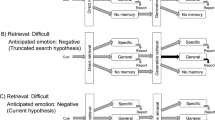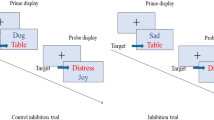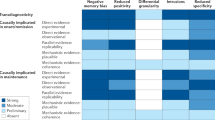Abstract
Background
People who ruminate about negative personal experiences seem to be engaged in practicing retrieval, with the expected consequences of perpetuating those very memories (see Roediger and Butler in Trends Cogn Sci 15:20–27, 2011).
Method
To provide an experimental model of the effect of retrieval practice on subsequent recall of autobiographical memories, we recruited students with low and high scores on the Ruminative Response Scale (Treynor et al. in Cogn Ther Res 27:247–259, 2003), gave them positive and ruminative cues to generate memories, and cued three rounds of practice of half of the memories from each valence.
Results
A week later, final cued recall for all memories showed strong practice effects, with the exception that ruminators benefited very little from the request to practice positive memories.
Conclusion
Recalling personal memories benefits from prior practice in bringing them to mind. However, these results provide insufficient evidence to recommend training recall of positive autobiographical memories to counteract rumination.


Similar content being viewed by others
Notes
There were actually two counterbalancing factors; see the “Materials” section.
Our experience suggests that undergraduate students do not show very stable scores on the RRS. Our practice in all experiments concerning rumination has always been to set aside data from individuals who do not produce a similar score at the end of the (first) experimental session—a score that keeps them within a few points of the original group designation.
There were no significant differences in the percentages of specific memories generated, according to any factor in the design, all ps > .28, all ηp2 < .02; overall M = 85.5, 95% CI [81.3, 89.9]. Out of the recalled memories on the final test, the same pattern obtained, all ps > . 47 all ηp2 < .02; overall M = 76.3, 95% CI [70.3, 82.4]. The apparent reduction likely resulted from the on-line nature of the test (i.e. no experimenter stressing specificity).
The practice effect on positive-memory recall by ruminators was marginally significant, F(1, 28) = 4.09, MSE = 343.94, p = .053, ηp2 = .13.
An additional analysis of emotion ratings that included a factor for measurement point did reveal a significant main effect for session, F(1, 51) = 7.71, MSE = 0.680, p = .008, ηp2 = .13, and a nonsignificant trend for an interaction of valence with session, F(1, 51) = 3.66, MSE = 0.893, p = .061, ηp2 = .07. On average, ratings were 0.21 points lower at delay—0.05 points lower for negative memories and 0.37 points lower for positive memories. Interpretation must take into account the confound that means were calculated across varying numbers of memories, due both to forgetting and to the uncontrolled conditions for the delayed test.
Readers might notice that ruminators and nonruminators recalled unpracticed positive and negative memories equally well. We assume that that this baseline level of recall reflects the probability that the test cues work similarly to their cuing tendency during the generation phase, as well as the similar tendencies to forget the episodic context of having produced them a week earlier.
References
Beck, A. T., Steer, R. A., & Brown, G. K. (1996). Manual for the Beck Depression Inventory (2nd ed.). San Antonio, TX: Psychological Corporation.
Berntsen, D. (1998). Involuntary autobiographical memories in and outside the laboratory: How different are they from voluntary autobiographical memories? Memory, 6, 113–141.
Bjork, R. A. (1975). Retrieval as a memory modifier: An interpretation of negative recency and related phenomena. In R. Solso (Ed.), Information processing and cognition: The Loyola Symposium (pp. 123–144). Earlbaum: Hillsdale, NJ.
Bradley, M. M., & Lang, P. J. (1999). Affective Norms for English Words (ANEW): Instruction manual and affective ratings (Technical Report C-1). Gainesville: Center for Research in Psychophysiology, University of Florida.
Cohen, N., Mor, N., & Henik, A. (2015). Linking executive control and emotional response: A training procedure to reduce rumination. Clinical Psychological Science, 3, 15–25.
Daches, S., Mor, N., & Hertel, P. (2019). Training to inhibit negative content affects memory and rumination. Cognitive Therapy and Research. https://doi.org/10.1007/s10608-019-10023-0.
Everaert, J., Bronstein, M. V., Cannon, T. D., & Joormann, J. (2018). Looking throught tinted glasses: Depression and social anxiety are related to both interpretation biases and inflexible negative interpretations. Clinical Psychological Science, 6, 517–528.
Fawcett, J. M., Benoit, R. G., Gagnepain, P., Salman, A., Bartholdy, S., Bradley, C., et al. (2015). The origins of repetitive thought in rumination: Separating cognitive style from deficits in inhibitory control over memory. Journal of Behavior Therapy and Experimental Psychiatry, 47, 1–8.
Hertel, P., Maydon, A., Cottle, J., & Vrijsen, J. (2017). Cognitive bias modification: Retrieval practice to simulate and oppose ruminative memory biases. Clinical Psychological Science, 5, 122–130.
Hertel, P. T., Maydon, A., Ogilvie, A., & Mor, N. (2018). Ruminators (unlike others) fail to show suppression-induced forgetting on indirect measures of memory. Clinical Psychological Science, 6, 872–881.
Hertel, P., Mor, N., Ferrari, C., Hunt, O., & Agrawal, N. (2014). Looking on the dark side rumination and cognitive-bias modification. Clinical Psychological Science, 2, 714–726.
James, W. (1890). Habit (p. 24). New York: H. Holt.
Joormann, J., & Gotlib, I. H. (2008). Updating the contents of working memory in depression: Interference from irrelevant negative material. Journal of Abnormal Psychology, 117, 182–192.
Joormann, J., Siemer, M., & Gotlib, I. H. (2007). Mood regulation in depression: Differential effects of distraction and recall of happy memories on sad mood. Journal of Abnormal Psychology, 116, 484–490.
Joormann, J., & Tran, T. B. (2009). Rumination and intentional forgetting of emotional material. Cognition and Emotion., 23, 1233–1246.
Koster, E. H. W., De Lissnyder, E., & De Raedt, R. (2013). Rumination is characterized by valence-specific impairments in switching of attention. Acta Psychologica, 144, 563–570.
Lyubomirsky, S., Caldwell, N. D., & Nolen-Hoeksema, S. (1998). Effects of ruminative and distracting responses to depressed mood on retrieval of autobiographical memories. Journal of Personality and Social Psychology, 75, 166–177.
Mather, M. (2006). Why memories may become more positive as people age. In B. Uttl, N. Ohta, & A. L. Siegenthaler (Eds.), Memory and emotion: Interdisciplinary perspectives (pp. 135–158). Malden: Blackwell Publishing.
Morris, C. D., Bransford, J. D., & Franks, J. J. (1977). Levels of processing versus transfer appropriate processing. Journal of Verbal Learning and Verbal Behavior, 16, 519–533.
Nolen-Hoeksema, S., Wisco, B. E., & Lyubomirsky, S. (2008). Rethinking rumination. Perspectives on Psychological Science, 3, 400–424.
Roediger, H. L., III, & Butler, A. C. (2011). The critical role of retrieval practice in long-term retention. Trends in Cognitive Sciences, 15, 20–27.
Rottenberg, J., Hildner, J. C., & Gotlib, I. H. (2006). Idiographic autobiographical memories in major depressive disorder. Cognition and Emotion, 20, 114–128.
Schlagman, S., & Kvavilashvili, L. (2008). Involuntary autobiographical memories in and outside the laboratory: How different are they from voluntary autobiographical memories? Memory & Cognition, 36, 920–932.
Takano, K., Van Grieken, J., & Raes, F. (2019). Difficulty in updating positive beliefs about negative cognition is associated with increased depressed mood. Journal of Behavior Therapy and Experimental Psychiatry, 64, 22–30.
Treynor, W., Gonzalez, R., & Nolen-Hoeksema, S. (2003). Rumination reconsidered: A psychometric analysis. Cognitive Therapy and Research, 27, 247–259.
Vrijsen, J. N., Dainer-Best, J., Witcraft, S. M., Papini, S., Hertel, P., Beevers, C. P., et al. (2019). Effect of cognitive bias modification-memory on depressive symptoms and autobiographical memory bias: Two independent studies in high-ruminating and dysphoric samples. Cognition and Emotion, 33, 288–304.
Vrijsen, J. N., Hertel, P. T., & Becker, E. S. (2016). Practicing emotionally biased retrieval affects mood and establishes biased recall a week later. Cognitive Therapy and Research, 40, 764–773.
Watkins, E. R., & Nolen-Hoeksema, S. (2014). A habit-goal framework of depressive rumination. Journal of Abnormal Psychology, 123, 24–34.
Watson, L. A., Berntsen, D., Kuyken, W., & Watson, E. R. (2012). The characteristics of involuntary and voluntary autobiographical memories in depressed and never depressed individuals. Consciousness and Cognition, 21, 1382–1392.
Young, K. D., Erickson, K., & Drevets, W. C. (2012). Match between cue and memory valence during autobiographical memory recall in depression. Psychological Reports: Mental & Physical Health, 111, 129–148.
Zetsche, U., Burkner, P.-C., & Schulze, L. (2018). Shedding light on the association between repetitive negative thinking and deficits in cognitive control—A meta-analysis. Clinical Psychology Review, 63, 56–65.
Acknowledgements
The authors are grateful to many students in the lab: Amaris Maydon for help with materials, Sarah Gorban, Victoria Marshall, Sierra Rodriguez, and Mariale Torres for scoring, Etienne Ramirez-Gonzales for conducting some sessions, and Samantha Wilkerson for the collection of pilot data.
Author information
Authors and Affiliations
Contributions
PTH and PH designed the experiment and constructed materials. Data collection and scoring were performed by PH and PS, who also wrote previous versions of the paper. PTH analyzed the data and wrote the final version, and all authors approved it.
Corresponding author
Ethics declarations
Conflict of interest
Paula T. Hertel, Paola Herrera and Pallavi Shamapant declare no conflicts of interest in the preparation of this research, data collection, or publication.
Human and Animal Rights and Informed Consent
This research was approved by the Trinity University Institutional Review Board, and students provided informed consent before participating. Anonymity of responses continue to be preserved.
Additional information
Publisher's Note
Springer Nature remains neutral with regard to jurisdictional claims in published maps and institutional affiliations.
Rights and permissions
About this article
Cite this article
Hertel, P.T., Herrera, P. & Shamapant, P. Rumination: Practicing Retrieval of Autobiographical Memories. Cogn Ther Res 45, 858–868 (2021). https://doi.org/10.1007/s10608-020-10118-z
Published:
Issue Date:
DOI: https://doi.org/10.1007/s10608-020-10118-z




